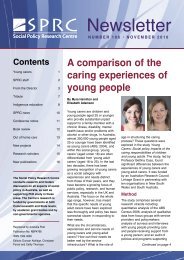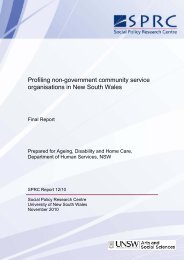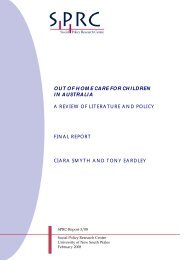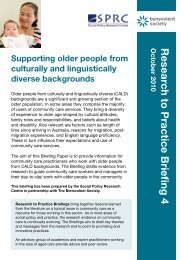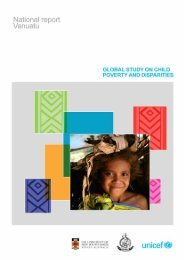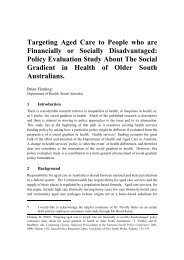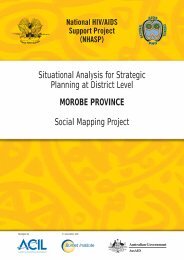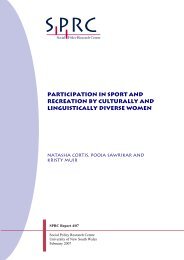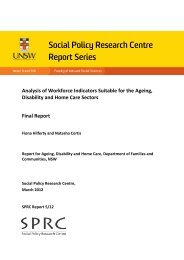A Strategic Assessment of the Children's Services Industry
A Strategic Assessment of the Children's Services Industry
A Strategic Assessment of the Children's Services Industry
- No tags were found...
Create successful ePaper yourself
Turn your PDF publications into a flip-book with our unique Google optimized e-Paper software.
STRATEGIC ASSESSMENT OF THE CHILDREN’S SERVICES INDUSTRY• Whe<strong>the</strong>r teachers or early childhood specialists are employed in early childhood programmes• Whe<strong>the</strong>r early childhood teacher specialisations are valued and required• Whe<strong>the</strong>r teachers in early childhood programmes have pay parity with <strong>the</strong>ir counterparts in<strong>the</strong> school sector.When a teacher qualification (or its equivalent) is not required within an early childhoodsetting, but is within a school, <strong>the</strong>n it is difficult to claim or create an equal partnership. InAustralia, <strong>the</strong> UK and Canada, teacher qualifications are required for preschool programmes,but not necessarily for long day care programmes. New Zealand is implementing a majorstrategy to improve staff qualifications by setting targets for <strong>the</strong> employment <strong>of</strong> registeredteachers in early childhood services, resulting in a minimum <strong>of</strong> 70 per cent regulated staffhaving an approved teaching qualification by 2012, with <strong>the</strong> remainder <strong>of</strong> staff studying foran approved teaching qualification (Mitchell and Brooking, 2007). The achievement <strong>of</strong> thisgoal has been supported by a range <strong>of</strong> training incentives including scholarships (Mitchell2004). In addition, wage parity has been achieved between teachers in kindergartens andteachers in schools (Mitchell et al. 2007). The UK is looking to reform its early yearsworkforce by improving qualifications across <strong>the</strong> early childhood sector (OECD 2006).Ano<strong>the</strong>r important consideration is whe<strong>the</strong>r <strong>the</strong> early childhood pedagogical component <strong>of</strong>teacher qualifications is valued. In Sweden, preschools are staffed by teachers with an earlychildhood specialisation (OECD, 2006). Canadian kindergarten teachers are not required tohave special training in early childhood (OECD 2003 p.29), and Australian preschools do notnecessarily require <strong>the</strong> employment <strong>of</strong> an early childhood teacher (Press 2006). Cheeseman(2007) argues that, in at least some Australian jurisdictions, early childhood policies centredon welfare and <strong>the</strong> delivery <strong>of</strong> early childhood programmes by welfare agencies, have servedto fur<strong>the</strong>r marginalise <strong>the</strong> role <strong>of</strong> early childhood teaching qualifications.Attracting and retaining staff in early childhood programmes have been cited as difficulties inAustralia (Community <strong>Services</strong> Ministers’ Advisory Council, 2006), New Zealand (Mitchellet al. 2007), Canada (Expert Panel, 2007) and <strong>the</strong> UK (Pugh, 2003). Many reports cite lowwages, and poor conditions, as major contributors to this problem (Expert Panel, 2007; OECD2006). In NZ, one fifth <strong>of</strong> teachers considered <strong>the</strong>ir workload to be excessive, with issues suchas excessive workload, and poorer working conditions more likely to arise in private centres.Never<strong>the</strong>less <strong>the</strong>re are also grounds for optimism, with 73 per cent <strong>of</strong> early childhoodeducators and teachers in New Zealand rating <strong>the</strong>ir morale as generally high, a higher ratingthan teachers in primary and secondary education settings (Mitchell et al. 2007).Systemic attention to monitoring and data collection; and a stable framework and long termagenda for research and evaluationThe need to better inform <strong>the</strong> development and evaluation <strong>of</strong> programmes relevant to infantsand young children has resulted in greater attention to <strong>the</strong> collection and collation <strong>of</strong> data onearly childhood programmes. The UN points to <strong>the</strong> need for comprehensive andcontemporary data ‘on all aspects <strong>of</strong> early childhood for <strong>the</strong> formulation, monitoring andevaluation <strong>of</strong> progress achieved, and for <strong>the</strong> assessment <strong>of</strong> <strong>the</strong> impact <strong>of</strong> policies’ (2005 np).Countries have sought to establish or enhance data sets in a number <strong>of</strong> ways including:• <strong>the</strong> funding <strong>of</strong> longitudinal research tracing <strong>the</strong> development <strong>of</strong> large cohorts <strong>of</strong> children overtime.• <strong>the</strong> ga<strong>the</strong>ring and evaluation <strong>of</strong> data at <strong>the</strong> population level.• improving existing data collection regimes, specific to early childhood programmes areas, byaddressing issues such as data compatibility.28



